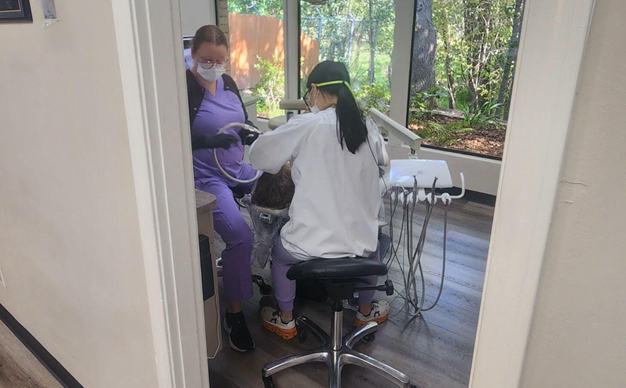
IMPORTANT INFORMATION ABOUT TOOTH EXTRACTION
At Discover Dental, the well-being and care of our patients are our utmost priority. Our team of highly skilled professionals is committed to providing a dental experience that is comfortable and stress-free. We strive to offer compassionate and personalized attention, delivering gentle and precise care that has earned us the trust and respect of our patients.
Although our primary goal is to preserve the integrity of your natural smile, there are instances where tooth extraction becomes necessary to safeguard your oral health and overall well-being.
Our office may recommend tooth extraction for several common reasons.
An over-retained deciduous tooth, commonly referred to as a "baby" tooth, can become severely decayed or damaged. Typically, a baby tooth will naturally fall out as the permanent tooth grows in. However, there are instances where the baby tooth remains firmly attached to the bone. This can happen if the roots of the baby tooth do not shrink as they should or if the baby tooth becomes fused to the supporting bone. Keeping baby teeth for too long can impact the development and alignment of your child's smile. As we monitor your child's smile as they grow, we will inform you if and when it is necessary to remove a baby tooth to allow the permanent tooth to come in properly.
If a tooth has severe decay and cannot be restored, it can cause significant damage to the tooth structure and potentially lead to nerve damage, dental infection, and other oral health issues. Neglecting a cavity can have serious consequences for your overall well-being. In cases where the tooth has suffered extensive structural damage and cannot be saved, a dental extraction may be necessary.
A tooth that has suffered severe fracture or cracking and cannot be repaired may also require extraction. Different forms of chips, cracks, and fractures can affect teeth, and the severity of the damage will determine if the tooth can be salvaged or if extraction is needed.
Wisdom teeth, also known as third molars, can cause problems if they are not properly positioned, impacted by other teeth, or decayed. While wisdom tooth extraction is often recommended for older individuals, it is more commonly suggested to remove problematic or potentially troublesome third molars in young adults at an earlier stage.
When the size of the teeth does not match the size of the jaw, overcrowded teeth can occur, resulting in an improperly aligned smile. To achieve a well-aligned, attractive, healthy, and functional bite, it may be necessary to remove certain permanent teeth as part of an orthodontic treatment plan.
What is the process for performing a tooth extraction?
Our office is committed to providing the best possible care for dental extractions, regardless of the reasons behind them. Our dentist will carefully review your medical and dental histories and discuss any special considerations for your treatment.
It is crucial that you inform us of any existing medical conditions or medications you are currently taking. In certain cases, additional precautions such as antibiotics or a change in medication may be required. We may also need a medical clearance. Please follow all pre-surgical instructions and let us know if you are feeling unwell or experiencing any symptoms on the day of your surgery.
Our primary objective is to minimize anxiety and ensure your comfort during the tooth extraction process. Before the procedure, we will address any medical concerns or precautions and provide you with pre-surgical instructions. We will also discuss post-surgical recommendations, including the possibility of replacing the extracted tooth or teeth and the best options for your ongoing care.
To accurately assess the tooth and determine the appropriate extraction method, we will conduct a thorough examination and take digital radiographs as needed. Extractions are typically categorized as either "simple" or "surgical extractions."

